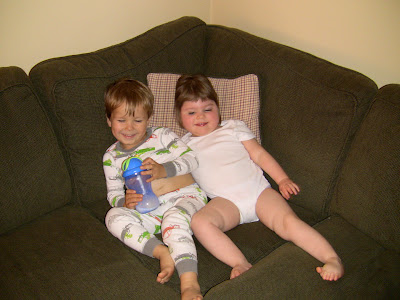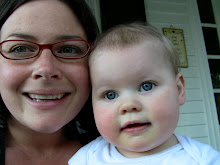After 3 solid years of searching for a diagnosis, last Friday, August 19th, genetic testing confirmed that Meredith has Variant Rett Syndrome due to a FOXG1 mutation. It's still settling in since we had pretty much come to terms with the idea that we would never get an answer. It's strange and surreal to think that the hunt is over, but we take great comfort in knowing what we are up against. Today we met with a Rett Syndrome pioneer, Dr. Khwaja, who is the Director of the Rett Clinic at Childrens' Hospital. He confirmed Meredith's diagnosis and told us he thinks in the coming years, it will become known as FOXG1 Syndrome, instead of Variant Rett. The FOXG1 gene was identified in 1994 and only linked to Variant Rett in 2008. Khwaja expects increased focus on FOXG1 as a result of the recent discovery and we hope this provides more information or even treatment for kids with this form of Variant Rett. To give you an idea of it's rarity, Meredith is only the third child Dr. Khwaja has ever diagnosed with a FOXG1 mutation.
With typical Rett Syndrome, kids have a period of normal development and then hit a point where they begin to regress. There are a few different kinds of Variant Rett, but with Congential Rett (meaning from birth) kids never have that period of normal development.
The FOXG1 gene tells the body how to make certain proteins important for brain development and growth and Meredith has a truncated gene. He said Meredith's exact mutation has never before been documented, but from the looks of it she falls into the "moderate to severe" presentation of the syndrome. He gave us a lot of information and the majority of it was actually good! Here are a few of the highlights:
1. NO REGRESSION - woohoo!!!! Meredith should continue on her leisurly path of development and make small gains. She won't lose the skills she has acquired.
2. This is a spontaneous defect that happened in development, so there is no need for Greg or I to be tested and no reason for us to think we passed this along to her.
3. Around the age of 10, many kids see a decrease in seizure activity. In some kids, they go away completely.
4. Walking/moving around is still on Meredith's wish list!! He said the biggest obstacle with FOXG1 kids is the ultra-low muscle tone. But with continued therapies, stander time (and he wants her using a gait trainer), she can make substantial gains in this area. Some kids do eventually learn to walk, but not until very late, age 8 or 9. We were given a script for 2 vitamins that can help with the growth and maintenance of muscle tissues to help with Mer's low tone: L-Carnitine and Ubiquinone. We are excited to get her going on these asap!
5. Nearly all kids are non-verbal. Not great news, but there are so many other forms of communication we can focus on and of all the losses we have mourned with Meredith's development, for some reason this one falls to the bottom of the list. Plus, having a husband who jabbers enough jibberish in the household for 5 three years olds gives us our fill : )
6. Meredith's life expectancy is about 40 years which we've been told should continue to be happy and healthy.
7. He recommended getting another MRI to get a better look at Meredith's brain since her last one was done at 9 months when the brain is still mostly water. This could provide more clues on her overall development moving forward.
8. There is a slight risk as kids get older of developing an irregular heart beat so we repeated an EKG to keep an eye on that. It's actually only documented in typical Rett, but we'll keep an eye on it as a matter of course. If it were to develop, it can be easily treated with medication.
There is amazing research being done right now on Rett and scientists have actually been able to reverse the symptoms in mice. We asked Khwaja if this is something we can be excited about for Meredith even though she has Variant Rett. He said they are working on creating a FOXG1 mouse now : ) We have high hopes for the future discoveries that will be made. Here is a link I found especially fascinating that explains the
mouse study. Meredith was also asked to participate in a medical study - readily accepted with a squeak and a giggle - which will help promote additional advancements in the field.
This diagnosis and the appointment today has provided Greg and I much closure when it comes to this journey. We both agreed today that when we came home, we felt as if we had finished a perpetual Iron Man and we could finally sit down. We can move forward with our lives and most importantly continue to provide Meredith every opportunity to thrive, knowing that the gains she makes are hers to keep.



















































